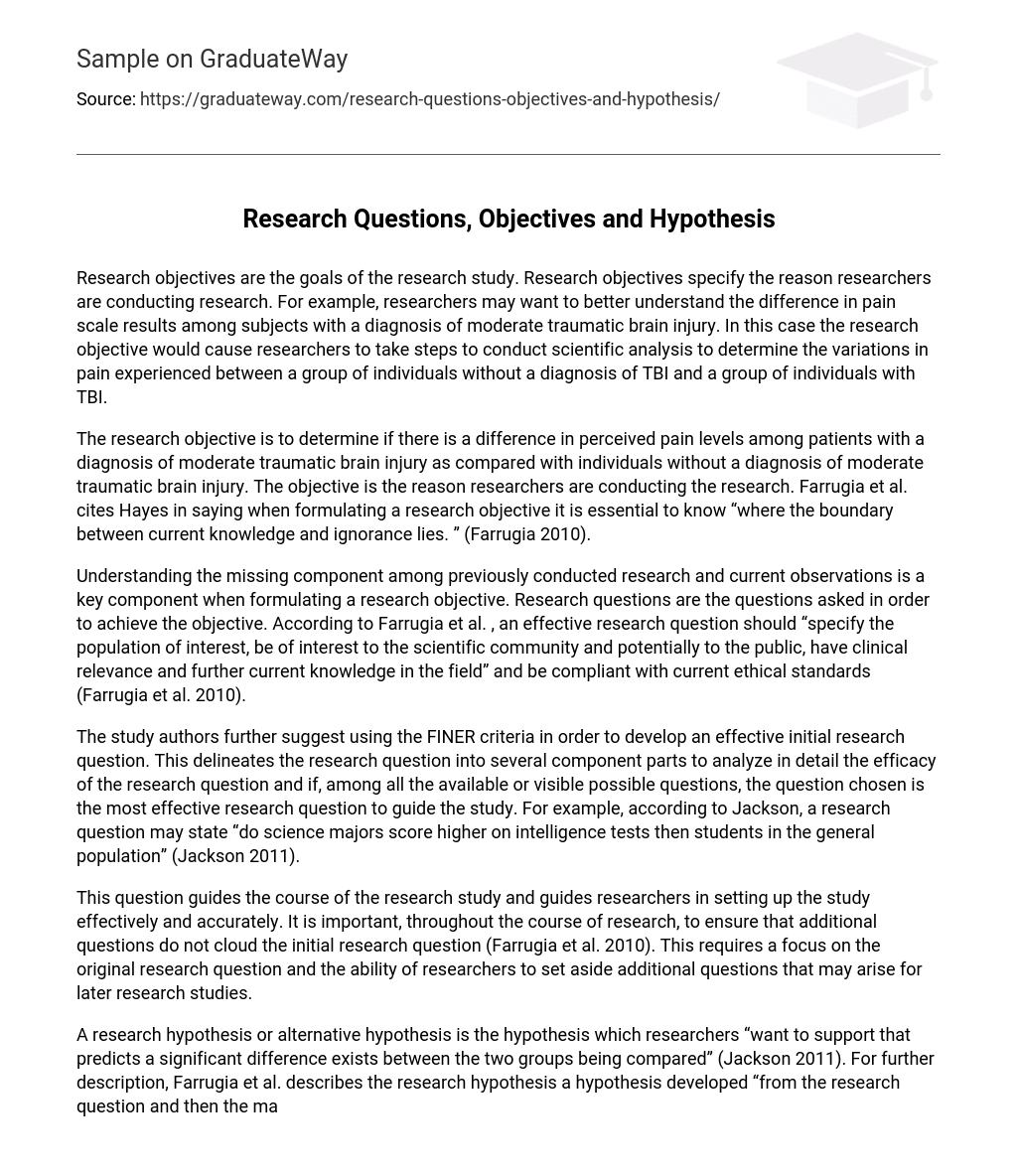The research objectives of a study are the goals that articulate the purpose of conducting the research. For instance, researchers aim to enhance their comprehension of variations in pain scale outcomes among individuals diagnosed with moderate traumatic brain injury. As a result, this objective drives scientists to perform scientific analysis to identify differences in perceived pain between a group without a TBI diagnosis and a group with TBI.
The purpose of the study is to examine if there is a difference in perceived pain levels among patients with moderate traumatic brain injury compared to those without. The primary aim is to enhance understanding and address uncertainties, as highlighted by Farrugia et al. (2010) who cite Hayes.
When formulating a research objective, it is essential to recognize the discrepancy between prior studies and present observations. Research questions serve as inquiries intended to accomplish the objective. As stated by Farrugia et al. (2010), a successful research question should specify the target population, attract attention from both the scientific community and possibly the public, hold clinical importance, enhance existing knowledge in the field, and adhere to ethical guidelines.
According to the study authors, the use of the FINER criteria is recommended for creating a strong initial research question. This involves breaking down the question into smaller parts to thoroughly examine its effectiveness and determine if it is the best question to guide the study. For instance, Jackson suggests a research question such as “do science majors score higher on intelligence tests than students in the general population” (Jackson 2011).
The research question is of utmost importance in directing and properly establishing the study. It is imperative to prevent other questions from diverting attention away from the initial research question. Researchers must stay concentrated on the original query and reserve any supplementary inquiries for future investigations (Farrugia et al. 2010).
The research hypothesis, also referred to as the alternative hypothesis, is the hypothesis that researchers strive to support. It forecasts a notable distinction between the two groups being compared (Jackson 2011). In addition, Farrugia et al. elaborates that the research hypothesis stems from the research question and outlines key elements of the study including sampling strategy, intervention (if applicable), comparison, and outcome variables. This summary sets the groundwork for testing, statistical analysis, and ultimately determining clinical significance (Farrugia et al.).
According to Jackson, the purposes of the research hypothesis and null hypothesis are different. The research hypothesis guides the direction of the study and determines the measures used. Jackson provides an example where a research hypothesis is derived from an initial objective: proving that children who participate in educationally-based after school programs have higher IQ scores than those who do not.
In a study conducted by Jackson (2011), it is proposed that engaging children in educational after school programs leads to higher IQ scores. In order to test this hypothesis, the researcher must establish a null hypothesis indicating no disparities between the groups being compared.
The null hypothesis posits that children who attend academically-based after school programs have the same IQ scores as those who do not attend these programs. By using inferential statistics, researchers can test and potentially support the research or alternative hypothesis through collected data. It is crucial to determine whether the hypothesis will be one-tailed or two-tailed.
According to Jackson (2011), a one-tailed hypothesis is when the researcher predicts the direction of the expected difference between groups. In contrast, a two-tailed hypothesis is an alternative hypothesis where the researcher predicts that compared groups differ without specifying the direction of difference. Both types of hypotheses, as stated by Jackson (2011), are essential in research and provide researchers with a foundation to construct their study.





